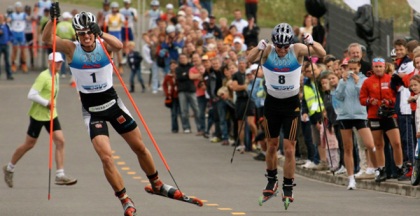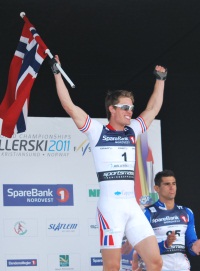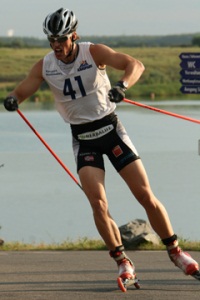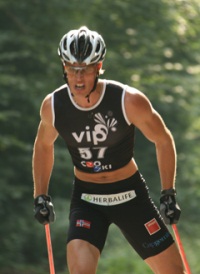Interview with Ragnar Bragvin Andresen, Rollerski World Champion
To mark the beginning of the GB Rollerski Race Series, I have interviewed Norway's leading rollerski superstar, Ragnar Bragvin Andresen.
In 2011 Ragnar became FIS Rollerski World Champion in the Sprint event, in front of a home crowd, overcoming adversity along the way -
IB: How did you get into rollerski racing?
RBA: I’m from a place named Greåker in Sarpsborg. We had almost no snow between 1990 and 2000. We rollerskied from Monday to Friday, and competed on snow in the area around Oslo in the weekends. Even though we had no snow, some of us were among the top skiers in Norway. When I was 16, I began at Hovden SkiGymnas, and my coach there, Ove Erik Tronvoll recommended me to try out rollerski racing. That year I became junior European Champion in sprint in Russia.
IB: What do you love most about the sport of rollerskiing?
RBA: Rollerskiing has everything I appreciate with doing sports: strength, speed, action, adrenaline and stamina. And of course a lot of pain through training. XC-skiing is great, but it does not have the speed, adrenaline and strength as you find in rollerskiing.
IB: How was it to become Rollerski World Champion in front of your home crowd in 2011?
RBA: The day I won the gold medal at the sprint is still the most amazing day of my life. I have a long story behind that day:
The end of 2010 and the whole of 2011 was a really difficult time for me. I started to fight against “burn out syndrome” after an virus infection in late October/ beginning of November 2010. I did not realized how serious that kind of illness is before it was too “late”. In the beginning, I just tried to train differently in the hope of making a big breakthrough in xc-skiing that winter. I was stronger than ever in everything that fall. I had just finished my best summer and fall ever. I had improved my top speed, strength, acceleration, and maybe the most important thing: my uphill skills. I really wanted to continue my walk on the road of improvement during the winter, but I learned one important thing that year: take it easy after illness!!
I got more and more ill during the winter, and everything collapsed in the middle of February 2011. From having a heart rate of 42 in the morning in September, I had now in an average morning resting heart rate of 77 from February to the end of April 2011. I was constantly tired, and once I collapsed during my daily shopping in the grocery store. I was in bed for 15-17 hours a day. It was a terrible time!
I started to improve my health slowly and focused on every detail that could affect my health. Because of all this, the gold medal tasted better than I could imagine!
IB: What would you say to anyone interested in taking up rollerskiing / rollerski racing?
RBA: Don’t hesitate to start up, begin now, and find out how it is in a life with: “no brakes, no speed limits, just rollerskiing”. I would recommend starting in a park, or other safe places. Don’t rollerski in the traffic before you know how to do a good and safe stop!
IB: What would a typical week's training for you involve?
RBA: A week for me depends on how it’s planned to be. Next week, I will be at a 5 days training camp and the program says 18 hours of training. That include easy training, sprint training, weight lifting etc.
IB: How does training mainly for rollerski racing differ from training mainly for XC skiing?
RBA: My opinion is that an average rollerski racer trains with higher speed, and has more focus on detail than an average xc-specialist. I believe that it’s possible to reach the top both in rollerskiing and xc-skiing. Jan Jacob Verdenius won the FIS rollerski world cup, and the FIS XC-sprint world cup in the same season. The Italians are racing a lot on rollerskis during the summer. Roland Clara is even better in uphill rollerskiing than he is in skiing.
IB: In the Norwegian media cross-country skiing seems to be bigger than football. Does rollerskiing get good coverage too?
RBA: Yes, rollerskiing gets good coverage in the media. This summer, there will be at least 8 races shown on Norwegian television. And the rollerski races are even more popular on TV than football.

IB: Is rollerskiing becoming more popular in Norway?
RBA: The popularity of rollerskiing is growing a lot in the whole of Scandinavia. Especially in Oslo and southern Sweden.
IB: How are the British cross-country skiers (eg Andrew Musgrave) regarded in Norway?
RBA: In past generations, we joked about the ski skills of the Danish and the British people. But now, it’s no longer a shame to ski like a British man. The podium place of Andrew Musgrave in the Norwegian championship got a lot of attention. And Musgrave has been a well known name in Norway for a couple of years now.
IB: How do you see rollerskiing / rollerski racing developing in the future?
RBA: I think rollerski racing will get a more and more important position in the federation. They play football all year around, and we have to ski all year around to get a stronger position among the sponsors and public. High speed and tight duels of top athletes is attractive entertainment wherever you are. It’s all about a good product, and a good organizer. Unfortunately there Is a lot of conservatism among the skiers out there. But who knows: if the global warming continues, rollerskiing will be the Olympic ski sport in four to five generations??… ;-)
IB: Thanks Ragnar, good luck for this season.
You should be able to see Ragnar on British Eurosport, which broadcasts the FIS Rollerski World Cup races.
Ragnar's website
GB Rollerski Racing website
FIS Rollerski
|




